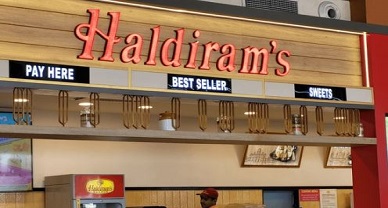Haldiram India Pvt. Ltd. V. Berachah Sales Corporation And Ors., 2024: A Case Study On “Well-Known Trademarks
Introduction
The brand ‘Haldiram’ has been synonymous with various savouries in India for many years, especially their legendary bhujia. The term Haldiram written in red over a yellow oval-shaped logo or the brand name written in white over a red oval-shaped logo or the v-shaped mark featuring the letters “HRB” arranged in a dynamic, angular configuration strikes our mind the moment we think about the said brand. A recent ruling by the Hon’ble Delhi High Court elevated the brand Haldiram as a well-known trademark. This is a landmark decision in the Indian intellectual property law regime as it sets a precedent for safeguarding established trademarks in India. Let us look into the said case i.e. Haldiram India Pvt. Ltd. vs. Berachah Sales Corporation and Ors., 2024 for further understanding of the concept of well-known trademarks.
Understanding Well-Known Trademarks
As per Section 2(zg) of the Trademarks Act, 1999, a well-known trademark is a mark that has gained wide recognition by a substantial segment of the public using the goods or services and that its use with other goods or services would most likely be perceived as indicating a connection of trade between such goods or services and the owner of the trademark. Well-known trademarks enjoy a higher degree of protection compared to ordinary trademarks, extending across all classes of goods and services even for dissimilar goods or services. The extra protection given to well-known trademarks is on the premise of such a mark’s wide reputation, consumer recognition and accrued goodwill.

Before 2017, trademarks in India were declared well-known based on court judgements and decisions of tribunals. However, the Trademark Rules of 2017 introduced a formal application process under Rule 124 which allowed trademark owners to request for a well-known status from the Registrar of the Trademarks. Upon receiving such an application, the Registrar evaluates it based on the criteria mentioned in Section 11(6) to 11(9) of the Trademarks Act, 1999. If the well-known status is granted then such a trademark is enlisted in the list maintained by the Indian Trademark Registry so as to provide enhanced protection against infringement.
Quick Insights on the Case
| NAME OF THE CASE | HALDIRAM INDIA PVT. LTD. VS. BERACHAH SALES CORPORATION AND ORS., 2024 |
| CITATION OF THE CASE | MANU/DE/2398/2024 |
| NAME OF THE COURT | HON’BLE HIGH COURT OF DELHI |
| PLAINTIFF IN THE CASE | HALDIRAM INDIA PVT. LTD. |
| DEFENDANT IN THE CASE | BERACHAH SALES CORPORATION AND ORS. |
| HON’BLE BENCH | JUSTICE PRATHIBA M. SINGH |
| DATE OF THE JUDGEMENT | 02ND APRIL, 2024 |
Background of the Case
The term ‘Haldiram’ was inspired by the nickname of the founder’s grandfather and it was established as a brand name in 1941. The name Haldiram has travelled from the narrow lanes of Bikaner, Rajasthan to the global culinary sphere thanks to its good quality snacks including delectable saviouries and sweets. As per the Plaintiff in the said case, the brand Haldiram uses two distinct marks – the term Haldiram written over an oval-shaped logo or the v-shaped mark featuring the letters “HRB” arranged in a dynamic angular setting. The name Haldiram has become synonymous with the aforementioned logo designs. The said logos instantly attract the consumer base given the legendary culinary contribution of the said brand over the years.
The defendants incorporated a company by the name “Haldiram Restro Pvt. Ltd’’ in 2019 and commenced their business under the said name. As a result, the plaintiff brought a suit against the defendants under Section 16(1)(b) of the Companies Act, 2013. Meanwhile, the defendants continued to register the domain name of their website as ‘www.haldiramrestro.com’. Further, they also sold food products such as mustard oil, salt, aata, desi ghee, etc through a page on Facebook. Based on all these facts and the consequences of the acts of the defendants, they were served a summons and ex parte ad-interim injunction restricting the defendant from manufacturing, selling, and dealing with the goods under the impugned mark.
Issues of the Case
- Whether the defendants infringed upon the rights of the plaintiff by causing deceptive similarity using the impugned marks?
- Whether the defendants can be restrained from using such marks by converting the ex-parte ad-interim injunction into a permanent injunction?
- Whether the said marks are eligible to be given the ‘well-known mark’ status?
Plaintiff’s Contentions
The plaintiff mentioned that Rs. 3500 crores were the advertisement expenses and Rs. 5000 were surpassed for sales. Further, the Plaintiff ran forty outlets in the Delhi-NCR region alone highlighting the fact that the impugned mark is eligible for being recognized as a well-known mark. The plaintiff claimed damages of Rs. 2.05 crores in addition to the compensation of actual costs. Further, the plaintiff mentioned that the manner of packaging and low-quality of products have significantly tarnished the reputation of their company thereby causing harm to the marks used by them in similar categories.
Defendant’s Contentions
The primary contention of the defendant was that the plaintiff did not disclose specific oppositions that had been filed by the defendant under Section 57 of the Trademarks Act, 1999. Further, the defendant stated that the impugned marks have been in dispute with several other entities, emphasizing that if all the litigations were clubbed to be initiated against the plaintiff then it would be the plaintiff at default since it would be the subject of such litigations.
The defendant also tried to bring to light the prior discrepancies relating to the ownership of marks and the succession of it to the plaintiff after Late Shri Ganga Bishan Agarwal. The defendant stated that the impugned mark lacked distinct character and that the plaintiff was not the exclusive proprietor of the mark ‘Haldiram’ as it is supposedly also owned by various other entities.
Judgement of the Case
The Hon’ble Delhi High Court, under Order IX Rule 6 CPC read with Order XVII Rule 3 CPC, proceeded against the defendant’s ex parte as the defendants ceased to appear for the proceedings. The case of G. Ratna Raj v. Sri. Muthukumarasamy Permanent Fund Ltd. was relied on by the Court to justify the ex parte proceedings. Further, the Court stated that since the impugned marks were being used by the plaintiff for a long period and rights associated with such marks which could be accrued through the common law and the Indian legislation – it would be detrimental to the plaintiff if the defendant would be allowed to use the impugned marks. The Court further stated that a majority of the contentions made by the defendant were irrelevant to the present case and they were only presented to distract the Court from the primary issues of the case. The Court resorted to the ‘Triple Identity Test’ to assess the extent of deceptive similarity vis-à-vis the trademark infringement. Further, the Court held that since the mark ‘Haldiram’ is being used for identical services within identical trade segments, it satisfies the triple identity test. Consequently, based on the aforementioned findings, the Court granted a decree of permanent injunction in favour of the plaintiff.
To deal with the issue of whether the impugned mark qualifies to be a “well-known trademark” or not, the Court relied on Section 2(zg) and Section 11(6) of the Trademarks Act, 1999 and the case of Tata Sons Ltd. v. Manoj Dodia wherein the essential requirements for qualifying as a “well-known trademark” thereby outlining which mark is capable and which is not capable of being included under the umbrella term of a well-known trademark. Further, the Doctrine of Dilution was applied by the Court to indicate that a mark may be nullified even when it does not create confusion amongst the consumer base but can potentially damage the accrued goodwill and reputation of the well-known mark, thereby diminishing its crucial purpose of indicating to whom such goods belong to. The Court also relied on the case of N.R Dongre v. Whirlpool Corporation and Anr. and the Doctrine of Spillover Reputation to highlight the importance of transborder reputation and the significance of protecting such reputation for the sake of the affected parties. Acknowledging the long-established presence of the plaintiff’s mark ‘Haldiram’ – the Court established it as a ‘well-known trademark” in the food industry, including eateries and restaurants. To highlight the importance of upholding intellectual property rights in India, the Court awarded Rs. 50 lakhs in damages in addition to Rs. 2 lakhs as costs.
Conclusion
The case of Haldiram India Private Limited v. Berachah Sales Corporation & Ors., 2024, outlined the importance of a well-known trademark in protecting well-established brands from entities trying to capitalize on the reputation of such established brands.
Author: R Sai Gayatri, in case of any queries please contact/write back to us via email to chhavi@khuranaandkhurana.com or at Khurana & Khurana, Advocates and IP Attorney.


